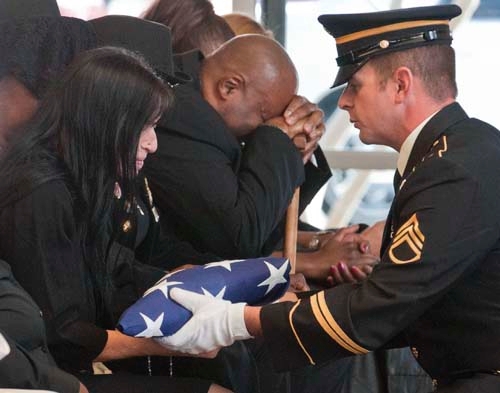Call for change amid tears at slain veteran’s funeral
Family and friends remembered Stanley LaVon Gibson on Friday as a patriotic Gulf War veteran, a loving but troubled husband, brother, son and uncle, and a Las Vegas black man whose death at the hands of police they hope will spur reforms involving the use of deadly force.
"It's time to turn things around. It's time to repent," the Rev. Gordy McDonnell told dozens of mourners who packed the Friendship Church of God in Christ.
"There is a light on every injustice. Today the spotlight is on Metro (Las Vegas police)," he said.
McDonnell referred to recent stories and columns in the Las Vegas Review-Journal and noted Gibson, 43, was shot and killed Dec. 12 by a police officer during a standoff about two weeks after the newspaper ran the series "Deadly Force: When Las Vegas Police Shoot, and Kill."
"The spotlight might be on Metro. The spotlight might be on Veterans Affairs. The spotlight is on each and every one of us," McDonnell said.
The pastor described Gibson as a proud Army veteran who suffered from post-traumatic stress disorder and who someday should be honored with a Stanley LaVon Gibson day or become the namesake of an "act" by Congress or state lawmakers to revamp government agencies' handling of veterans battling anxiety and depression.
"Brother Stanley was a fighter. He didn't relent. He didn't give in, and I thank God for him," McDonnell said.
"We need change to take place in Las Vegas, Nevada. Change needs to happen in the country," he said with outstretched arms in a delivery akin to Martin Luther King Jr.
WAR'S INVISIBLE WOUNDS
McDonnell asked all U.S. military veterans at the service to stand and be recognized after he talked about soldiers who, like Stanley Gibson, have returned home with the invisible wounds of war.
"We don't know what they've gone through. We don't know what battles they fought," he said.
"Remember Stanley stood for something, and this nation and this world has to stand for what is right. We celebrate a hero today."
Gibson, a cook in the 327 Infantry Regiment, was among the troops deployed in early 1991 to Saudi Arabia. They were sent to bury the dead and clean up the charred carnage on the Highway of Death and other escape routes, where armed Iraqi convoys retreating from Kuwait were annihilated by U.S. airstrikes.
Years after the Gulf War, he started having nightmares that crescendoed into anxiety fits. His mood swings were paired with depression from five surgeries on his face to repair damage he blamed on exposure to remnants of depleted uranium in anti-tank rounds that had been used in the Iraqi army's retreat on Highway 80 between Kuwait City and Basra, Iraq.
After the Department of Veterans Affairs reduced his compensation rating for cancer, then reinstated it, and then reduced it again, he lost trust in the VA.
On Oct. 24, during an appointment with a VA doctor to discuss cutbacks in his cancer compensation, he became loud and confused and was apprehended by security officers for aggressively confronting the doctor. He later pleaded guilty in U.S. District Court to assaulting a federal employee.
In late October, he and his wife, Rondha , came to the Review-Journal and talked about his Highway of Death experience and the problems he was having with the VA.
Later, on Nov. 12, he called the newspaper saying he was a "desperate man" because the couple's rental home had gone into foreclosure and they were being evicted.
His medications for pain and anxiety were running out on Dec. 7 when staff at the VA Southern Nevada Healthcare System canceled his appointment to renew his prescription because the doctor's husband had been hospitalized. Clerks canceled all of the doctor's appointments for the day though she showed up for work.
Two days before he died, Stanley Gibson had been taken to the Las Vegas jail after he was stopped by police during a mental breakdown. He was supposed to be put on a 72-hour psychiatric hold but was released less than eight hours later.
The next night, he got lost on his way home and turned into the wrong apartment complex. Mistaken for a burglar, police responded and wedged his car between two cruisers. After a half-hour, police tried to flush the unarmed veteran out of his parked Cadillac by firing a nonlethal beanbag shotgun blast.
They had planned to use pepper spray to force him out of the car. But when the beanbag blast occurred, officer Jesus Arevalo fired seven rounds from an AR-15 assault rifle into the car, killing him.
'LITTLE BIG MOUTH'
At Friday's memorial service, Stanley Gibson's big brother, Rudy Gibson, reflected on their childhood in Las Vegas and playing football at Eldorado High School.
He described his stubborn little brother "getting his clock cleaned." His heart was in the game, but his physique wasn't made for two daily practices.
"A long time ago, I started calling him 'Little Big Mouth,' " a heartbroken Rudy Gibson said.
"I want you to know I loved him. I'm proud of him," he said through tears and with so much emotion he nearly collapsed.
Their sister Linda Young said Stanley deserves peace and recognition.
"He fought for this country. He fought for every cause. He fought for everybody he knew," she said. "His battle did not stop when he came home from the Gulf War."
Veterans on motorcycles with U.S. flags flapping high above their rear wheels led the funeral procession from the church on Washington Avenue to the Southern Nevada Veterans Memorial Cemetery in Boulder City.
At the cemetery, pallbearers wearing white gloves escorted his flag-draped casket to the front of the chapel, where taps was played.
Members of an Army honor guard then folded the flag into a triangle and one of them knelt while he handed it to Rondha Gibson.
A procession of mourners walked to his burial site, where family members dropped red carnations in his grave.
Contact reporter Keith Rogers at krogers@reviewjournal.com or 702-383-0308.
WORDS OF MOURNING
This poem was written by Rondha Gibson and printed in the program handed out at Friday's memorial service for her husband, Stanley LaVon Gibson.
I Wish My Love
I wish for one more day with you
To see your face
To hold your hand
To call your name
To hear your voice one last time
I wish I had just a few more minutes
A little more time
One last hug, one more kiss, one last smile
It is hard to grasp that this is now my reality
Life without my true love and just wishes
Although you left me too soon
You will forever remain in my heart
Till the day we are together again
Thank you for loving me
Your "Boog,"
Rondha Gibson

















